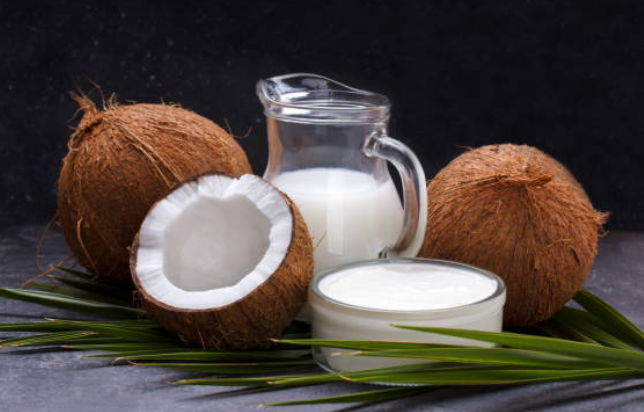Coconut Oil for Skin: Moisturize, Sun Damage, Acne, Dermatitis, Psoriasis, Eczema

When it comes to beautiful, moisturized skin, you don’t have to spend a lot of money. Coconut oil is one of the most effective natural moisturizers around, helping to combat dry skin and dramatically improving its appearance.
Moisturizer
Due to its vitamin E content, coconut oil is not only a great moisturizer but also helps prevent premature aging of the skin, so it is always a good idea to apply a little on those areas of our body where the first wrinkles begin to appear. Coconut oil is often used in skin care products because it is a natural moisturizer and emollient that can help to nourish, hydrate the dry, flaky skin.
To use coconut oil for skin care, you can apply a small amount of melted coconut oil to your skin and massage it in until it is fully absorbed. You can use coconut oil on your face, body, or hands, and it can be used as a moisturizer or a makeup remover.
Sun Damage
Coconut oil contains antioxidants that may help to protect the skin from the damaging effects of the sun. However, it is important to keep in mind that coconut oil is not a replacement for a broad-spectrum sunscreen and should not be used as such. The best way to protect your skin from sun damage is to use a broad-spectrum sunscreen with an SPF of at least 30, and to reapply it every two hours or immediately after swimming or sweating.
If you have already experienced sun damage, you can try using coconut oil as part of a skin care routine to help nourish and repair the skin. To use coconut oil for sun-damaged skin, you can apply a small amount of melted coconut oil to your skin and massage it in until it is fully absorbed. You can use coconut oil on your face, body, or hands, and it can be used as a moisturizer or a makeup remover.
In addition to using coconut oil, you can try the following tips to help repair sun-damaged skin:
- Wear a broad-spectrum sunscreen with an SPF of at least 30 every day, even on cloudy days.
- Avoid prolonged sun exposure, especially between the hours of 10 a.m. and 4 p.m., when the sun’s rays are the strongest.
- Wear protective clothing, such as a wide-brimmed hat, long-sleeved shirt, and sunglasses, when spending time in the sun.
- Stay hydrated by drinking plenty of water throughout the day.
- Use skin care products that contain antioxidants, such as vitamin C or green tea, to help protect the skin from free radical damage.
Skin Inflammation
Coconut oil has anti-inflammatory properties that may be helpful in reducing inflammation on the skin. To use coconut oil for skin inflammation, you can apply a small amount of melted coconut oil to your skin and massage it in until it is fully absorbed.
In addition to using coconut oil, you can try the following tips to help reduce skin inflammation:
- Avoid using harsh skin care products or ingredients that can irritate the skin, such as alcohol, fragrances, or sulfates.
- Avoid exposing the skin to extreme temperatures or humidity.
- Avoid picking at or scratching inflamed skin, as this can make the inflammation worse and increase
Acne
Coconut oil has antimicrobial properties that may be helpful in reducing acne. When applied to the skin, coconut oil can help to:
- Moisturize dry, acne-prone skin: Coconut oil is a natural emollient that can help to moisturize and hydrate dry, flaky skin.
- Kill acne-causing bacteria: Coconut oil contains lauric acid, a type of medium-chain fatty acid that has antimicrobial properties. This means that it can help to kill the bacteria that can cause acne, such as Propionibacterium acnes.
To use coconut oil for acne, you can apply a small amount of melted coconut oil to your skin and massage it in until it is fully absorbed. You can use coconut oil on your face, body, or hands, and it can be used as a moisturizer or a makeup remover. It’s important to use a small amount of coconut oil, as too much can leave a greasy residue on the skin.
It’s worth noting that coconut oil is a type of saturated fat and can clog pores if used in excess. If you have oily or acne-prone skin, you may want to use coconut oil sparingly or avoid it altogether. It’s also a good idea to patch test coconut oil on a small area of your skin before using it more widely, to make sure that you do not have any negative reactions to it.
If you have persistent or severe acne, it is important to consult a dermatologist or healthcare professional for proper diagnosis and treatment.
Dermatitis
Coconut oil may be helpful in reducing the symptoms of dermatitis, a common skin condition characterized by inflammation, redness, and itching. To use coconut oil for dermatitis, you can apply a small amount of melted coconut oil to your skin and massage it in until it is fully absorbed.
In addition to using coconut oil, you can try the following tips to help reduce the symptoms of dermatitis:
- Avoid using harsh skin care products or ingredients that can irritate the skin, such as alcohol, fragrances, or sulfates.
- Avoid exposing the skin to extreme temperatures or humidity.
Psoriasis
Coconut oil may be helpful in reducing the symptoms of psoriasis, a common skin condition characterized by red, scaly patches of skin. To use coconut oil for psoriasis, you can apply a small amount of melted coconut oil to your skin and massage it in until it is fully absorbed. Avoid picking at or scratching scaly skin, as this can make the condition worse and increase inflammation.
Eczema
Coconut oil may be helpful in reducing the symptoms of eczema, a common skin condition characterized by red, itchy, and inflamed patches of skin. If you have persistent or severe eczema, it is important to consult a dermatologist or healthcare professional for proper diagnosis and treatment. Eczema is a common skin condition that can be treated with a variety of medications and skin care products, and it is important to use the appropriate treatment.
Dry Skin
Coconut oil is a natural oil that is often used in skin care products because it is able to penetrate the skin and provide deep moisturization.
In addition to using coconut oil, you can try the following tips to help moisturize dry skin:
- Drink plenty of water to help hydrate the skin from the inside out.
- Avoid hot showers and baths, as they can strip the skin of its natural oils and make it feel drier. Instead, use lukewarm water and a gentle, moisturizing soap.
- Use a humidifier to add moisture to the air and help keep the skin hydrated.
- Avoid using harsh skin care products or ingredients that can irritate the skin, such as alcohol, fragrances, or sulfates.
- Avoid exposing the skin to extreme temperatures or humidity.
Need more reasons to use it? Coconut oil is one of the most effective natural remedies to keep our skin and hair in the best condition. For all these tips to work perfectly, don’t forget to buy top quality coconut oil available on Amazon.

Nilam is the owner and writer of EverydayCares.com. She is an experienced pharmaceutical professional and believes that many of the health problems can be cured naturally at home. She enjoys reading scholarly medical journals and gets inspiration to write up-to-date practical information and resources and makes sure all of the articles are of the highest quality. The best way to reach her is via [email protected]
Medical Disclaimer:
The contents on everydaycares.com, such as text, graphics, images, and other materials care for informational purposes only. The content is not intended to be a substitute for professional medical advice, diagnosis, or treatment. Always seek the advice of your physician or other qualified health provider with any questions you may have regarding a medical condition. Never disregard professional medical advice or delay in seeking it because of something you have read on this website! Use of any information contained in this website is at the sole choice and risk of the reader.

